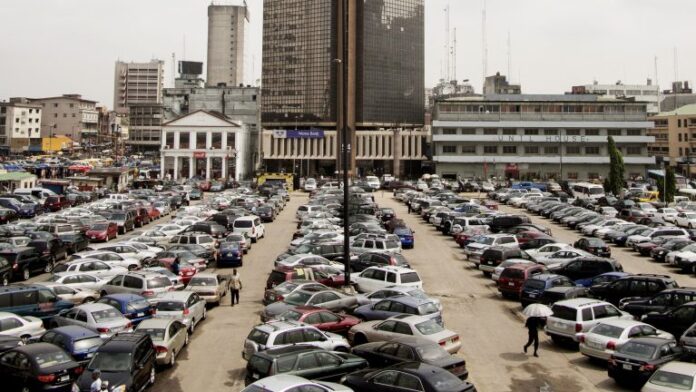LAGOS: Owning a car in Nigeria, once considered achievable for the middle class, has now become a luxury. Over the past two to three years, vehicle prices both brand-new and fairly used, have climbed to unprecedented levels.
The causes are multi-layered: inflation, naira devaluation, the unification of exchange rates for the dollar, and high clearing charges at Nigerian ports. Together, these forces have turned the auto market into one of the most dramatic case studies of price inflation in recent history.
Nigeria’s inflation has consistently been in double digits, peaking at 34.8% in 2024 before gradually declining but still remaining among the highest globally. Inflation does not just affect food or rent it ripples across all sectors, including automobile importation and sales.
Car dealers, already grappling with rising operational costs office rent, electricity bills, staff salaries, logistics are left with no option but to pass these expenses onto car buyers. Similarly, inflation drives up the cost of spare parts, tyres, lubricants, and other maintenance components.
This indirectly discourages buyers from acquiring new cars, yet paradoxically keeps demand high for used cars, further pushing their prices up.
The naira has lost significant value against the US dollar, the currency in which most cars are purchased abroad. Two years ago, in 2023, the exchange rate hovered around ₦450–₦500 per dollar at the official window, while the parallel market was higher. By mid-2025, the rate had floated to ₦1,400–₦1,500 per dollar.
For importers, this means that a car bought for $20,000 abroad that once cost about ₦9 million to import in 2023 (excluding clearing) now requires ₦28–₦30 million before even factoring in duties and levies. This alone accounts for more than a 200% increase in prices of vehicles across board.
To streamline Nigeria’s multiple exchange rates, the government implemented a policy of unification in 2023. The idea was to attract foreign investment and eliminate arbitrage between official and parallel rates.
However, for car importers, this policy meant the end of access to subsidized official rates. Importers now source dollars at market-driven rates often three times higher than what they previously paid.
The result: a sudden surge in the cost of cars, especially newer models that rely on large dollar transactions.
Clearing charges are another chokehold on the Nigerian auto market. To legally clear a vehicle, importers must pay several levies:
-
20% Import Duty
-
15% NAC Levy (National Automotive Council)
-
7% Port Surcharge
-
1% CISS (Comprehensive Import Supervision Scheme)
-
4% FOB levy
Combined, these charges can add 35–47% on top of the car’s purchase price. For instance, a vehicle valued at ₦20 million abroad may attract an additional ₦7–9 million in clearing charges. In cases where the car is worth more, clearing charges alone can hit ₦20 million–₦40 million, depending on valuation.
This explains why many Nigerians have resorted to purchasing vehicles through alternative channels or leaving them stranded at ports.
Concrete examples highlight the shocking trend:
-
Toyota Camry
-
2023 price: ₦36M–₦45M
-
2025 price: ₦80M–₦90M
-
Increase: 100–122%
-
-
Toyota RAV4 (2016 model)
-
2020 price: ₦13M
-
2025 price: ₦30M
-
Increase: 131%
-
-
Honda Civic (2008 model)
-
2020 price: ₦1.5M
-
2025 price: ₦8.5M
-
Increase: 467%
-
-
Toyota Hilux (2013 model)
-
2020 price: ₦6M
-
2025 price: ₦18M
-
Increase: 200%
-
-
Toyota Corolla (2004 model)
-
2020 price: ₦1.5M
-
2025 price: ₦9M
-
Increase: 500%
-
These figures show that even fairly used vehicles that once served as affordable options for middle-income Nigerians have now become out of reach.
A Honda Civic, once a staple for young professionals, has risen by nearly 500% in just five years.Even the ever-popular Toyota Corolla, once known as the “people’s car,” now sells for the price of a modest house in some Nigerian cities.
The combined effects of these factors mean car prices are rising faster than salaries, making ownership nearly impossible for many.
Middle-class families, who previously aspired to own cars after a few years of saving, now find themselves priced out of the market.
Businesses reliant on fleets of vehicles for logistics and delivery face higher operating costs, which they pass down to consumers in the form of increased product prices fueling yet another cycle of inflation.
In urban areas like Lagos and Abuja, ride-hailing services such as Uber and Bolt are already charging higher fares, as drivers struggle to purchase or replace cars. Rural areas, on the other hand, are seeing greater reliance on motorcycles and second-hand cars of questionable reliability.
Nigeria’s car price explosion is not just an auto market problem; it reflects the broader economic instability of the country. Inflation, currency weakness, harsh import policies, and port charges have combined to make vehicle ownership a privilege.
Unless these structural issues are addressed, the dream of owning a car will remain out of reach for the majority of Nigerians, further widening the gap between the wealthy and the struggling middle class.



